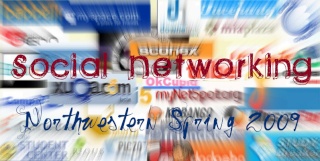more on network privacy
2 posters
Page 1 of 1
 more on network privacy
more on network privacy
http://mashable.com/2008/08/22/do-privacy-and-advertising-mesh/
The link above is another iteresting article that points to some insight into how advertisers can violate individual privacy in order to make their ads more affective.
In the article, the author writes about the methods used by a company called Lotame, which finds out iformation bout individuals or groups and uses this information to make advertisements of companies more affective. This personalized method will make advertisements much more affective than the CPM model.
Naturally, the big nework that comes to mind is Facebook, which can track personal information about individuals. Lotame and Facebook's new aim referred to as 'Engagemet advertising' will most likely change the way that companis advertise. This will lead to major changes in online advertisements and more companies will try to target its customers through the internet through the use of more meaningful data.
Therefore, although tight social networks can oftentimes be beneficial, increasingly rising privacy concerns may make networks with less external links more appealing to audiences who want to enter a network, but do not want to release their personal information to individuals or firms outside of their network.
The link above is another iteresting article that points to some insight into how advertisers can violate individual privacy in order to make their ads more affective.
In the article, the author writes about the methods used by a company called Lotame, which finds out iformation bout individuals or groups and uses this information to make advertisements of companies more affective. This personalized method will make advertisements much more affective than the CPM model.
Naturally, the big nework that comes to mind is Facebook, which can track personal information about individuals. Lotame and Facebook's new aim referred to as 'Engagemet advertising' will most likely change the way that companis advertise. This will lead to major changes in online advertisements and more companies will try to target its customers through the internet through the use of more meaningful data.
Therefore, although tight social networks can oftentimes be beneficial, increasingly rising privacy concerns may make networks with less external links more appealing to audiences who want to enter a network, but do not want to release their personal information to individuals or firms outside of their network.
Elif Koru- Posts : 20
Join date : 2009-04-01
 Re: more on network privacy
Re: more on network privacy
In addition to the relationship between the advertisements and the social network sites, privacy also depends on the information that can be seen among members within the online social network. I recently joined LinkedIn, which helps individuals make connections to help find jobs. As I was searching for people I know, I came across a statement: "Important: Only invite people you know well and who know you. Find out why." Once I clicked on the link, this message popped up:
Connecting to someone on LinkedIn implies that you know them well:
* They’ll have access to people you know
* Others may ask you about them and vice versa
* You’ll get updates on their activity
LinkedIn lets you invite colleagues, classmates, friends and business partners without entering their email addresses.
However, recipients can indicate that they don’t know you. If they do, you’ll be asked to enter an email address with each future invitation.
That statement seems so obvious, I laughed a little, but when thinking about it, the numerous Facebook friend requests came to mind from people that I don't know. I am surprised that a statement like this is not on all social networking sites that users would have to read before requesting to be friends with another member.
The growth of the online social networks is continually helping nodes form edges with other nodes in the network, but are these edges real? Do the two nodes really know each other? If not, then maybe the dependence on online communication as the primary avenue for meeting new people is becoming more prevalent.
Connecting to someone on LinkedIn implies that you know them well:
* They’ll have access to people you know
* Others may ask you about them and vice versa
* You’ll get updates on their activity
LinkedIn lets you invite colleagues, classmates, friends and business partners without entering their email addresses.
However, recipients can indicate that they don’t know you. If they do, you’ll be asked to enter an email address with each future invitation.
That statement seems so obvious, I laughed a little, but when thinking about it, the numerous Facebook friend requests came to mind from people that I don't know. I am surprised that a statement like this is not on all social networking sites that users would have to read before requesting to be friends with another member.
The growth of the online social networks is continually helping nodes form edges with other nodes in the network, but are these edges real? Do the two nodes really know each other? If not, then maybe the dependence on online communication as the primary avenue for meeting new people is becoming more prevalent.
Brooke Stanislawski- Posts : 22
Join date : 2009-04-03
 Similar topics
Similar topics» Ads and YOUR privacy
» CIA uses Facebook, NSA wants social networking data
» Invasion of privacy? yes or no?
» Online Privacy - or the lack of it
» Privacy Approximation Ratios
» CIA uses Facebook, NSA wants social networking data
» Invasion of privacy? yes or no?
» Online Privacy - or the lack of it
» Privacy Approximation Ratios
Page 1 of 1
Permissions in this forum:
You cannot reply to topics in this forum|
|
|
